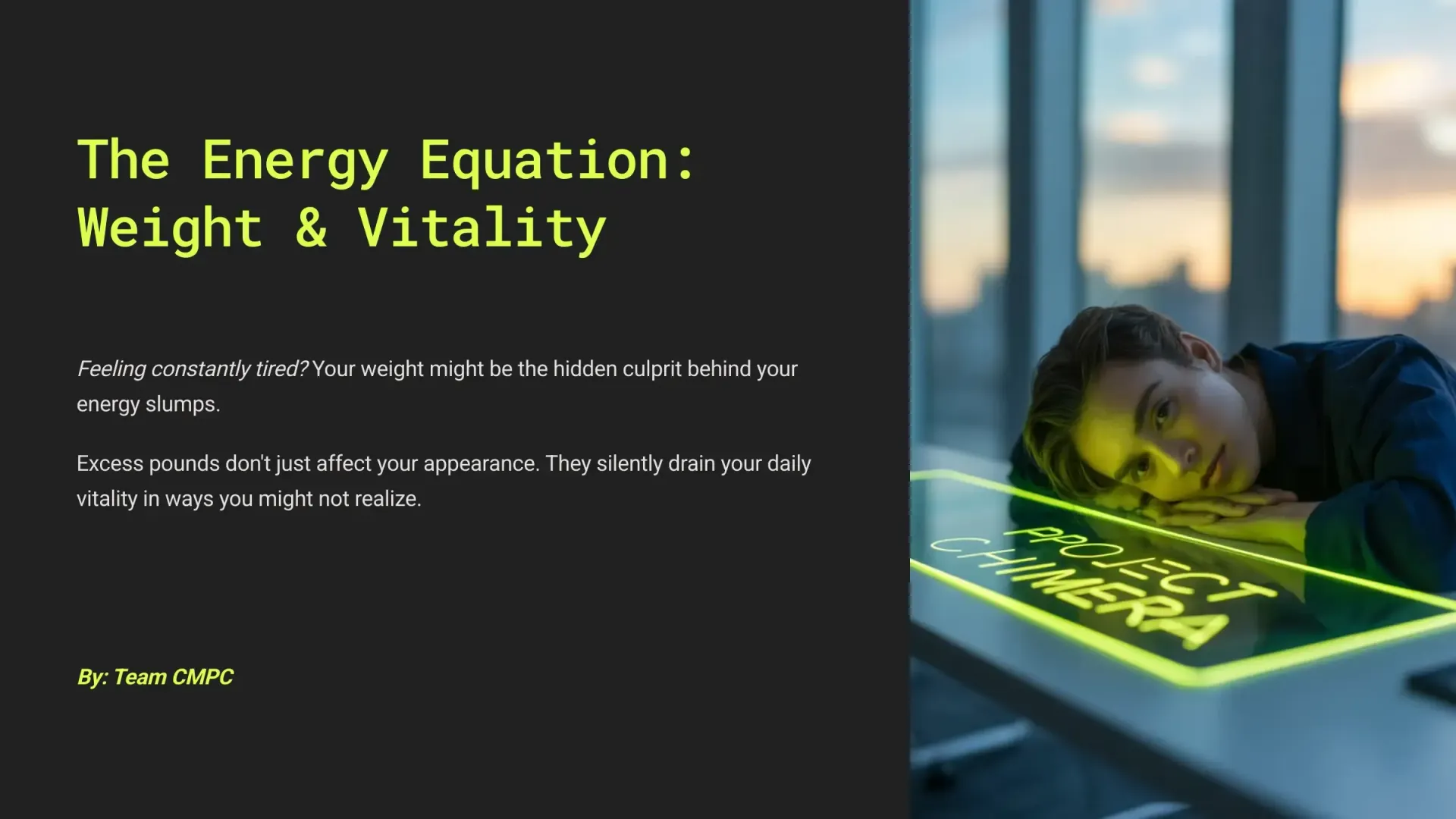
Many of our Kanata patients express frustration with persistent fatigue and sleep problems, often not realizing these issues may be connected to their weight. The relationship between excess weight, sleep quality, and energy levels is significant yet frequently overlooked in discussions about weight-related health concerns.
At Chatterjee Medicine Professional Corporation (CMPC), we recognize the importance of good sleep and sufficient energy for overall well-being. In this comprehensive guide, we will examine how excess weight influences sleep and energy levels and what residents of local communities can do to enhance their health.
The Weight-Sleep Connection: How Excess Weight Disrupts Rest
Sleep problems are approximately three times more common in people with obesity compared to those at a healthy weight. This connection stems from multiple physiological and physical factors.
Sleep Apnea: A Common but Serious Sleep Disruptor
Obstructive sleep apnea (OSA) represents the most significant sleep disorder linked to excess weight. This condition occurs when your airway repeatedly collapses during sleep, temporarily cutting off breathing. The relationship between weight and sleep apnea is positive:
- In individuals with obesity, excess tissue in the neck and throat can physically obstruct the airway during sleep. This obstruction leads to breathing pauses that disrupt sleep dozens or even hundreds of times per night.
- Even modest weight gain increases sleep apnea risk, and a weight gain of 10% increases the risk of developing OSA by approximately sixfold. This dramatic increase highlights how sensitive airway function is to weight changes.
Sleep apnea evaluation may be warranted for experiencing loud snoring, gasping during sleep, or daytime sleepiness, especially if you're carrying excess weight.
Beyond Apnea: Other Weight-Related Sleep Disruptions
Even without sleep apnea, excess weight can affect sleep quality through several mechanisms:
- Increased inflammation throughout the body disrupts normal sleep regulation. Inflammatory compounds can interfere with brain centers that control sleep-wake cycles.
- Acid reflux (GERD) occurs more frequently with excess weight and can disturb sleep. Lying flat allows stomach acid to flow upward, causing discomfort that interrupts sleep.
- Joint pain and discomfort, more common with excess weight, can make finding a comfortable sleeping position difficult. The resulting discomfort often leads to frequent position changes and sleep fragmentation.
These disruptions may not completely wake you but can prevent you from reaching or maintaining the deeper, restorative sleep stages necessary for feeling refreshed.
The Impact of Poor Sleep Positioning
Excess weight can restrict comfortable sleeping positions, further compromising sleep quality:
- Limited sleeping positions due to breathing difficulties or discomfort can reduce sleep quality. Many people with excess weight can only sleep comfortably in certain positions, restricting natural sleep movement.
- Pressure points develop more readily when excess weight concentrates pressure on specific body areas. These pressure points can cause pain and numbness, leading to additional sleep disruptions.
Appropriate mattresses and pillows designed for higher body weights can help mitigate some of these effects for patients struggling with these issues.

The Energy Equation: How Weight Affects Daytime Vitality
Energy levels aren't just about how you sleep; they're influenced by multiple factors that affect body weight.
The Physical Burden of Excess Weight
Carrying extra weight requires more energy for every movement:
- Additional physical effort is needed for basic activities like walking, climbing stairs, or standing. This increased effort can be quantified; each extra pound requires approximately 8 additional calories to move that weight during daily activities.
- Cardiovascular strain increases as your heart works harder to supply blood to a larger body mass. This increased workload means your cardiovascular system operates at a higher percentage of its maximum capacity, even at rest.
The increased energy expenditure creates a baseline of fatigue that persists throughout the day, especially toward the evening.
Metabolic Factors Affecting Energy
Beyond the physical burden, metabolic changes associated with excess weight can significantly impact energy levels:
- Insulin resistance, more common with excess weight, affects how your body processes and stores energy from food. When cells become resistant to insulin, glucose can't efficiently enter cells to provide energy, contributing to fatigue.
- Hormonal imbalances affecting thyroid function, stress hormones, and sex hormones can all influence energy regulation. These hormonal systems become increasingly dysregulated as weight increases.
These metabolic factors help explain why fatigue persists even during sedentary activities that require minimal physical exertion.
The Vicious Cycle: Fatigue, Inactivity, and Weight Gain
Perhaps most frustrating is how energy problems can perpetuate weight issues:
- Fatigue leads to reduced physical activity, further decreasing fitness and energy levels. This downward spiral can be challenging to interrupt without simultaneously addressing energy and weight.
- Low energy often drives increased caffeine consumption and high-calorie foods for quick energy boosts. These short-term solutions typically worsen the underlying issues.
Addressing energy and weight management is crucial for patients caught in this cycle; breaking the pattern requires a combined approach instead of focusing on either issue in isolation.
Sleep Disorders Associated with Excess Weight
Several specific sleep disorders occur more frequently in individuals with excess weight, contributing to both sleep and energy problems.
Obstructive Sleep Apnea: The Hidden Health Risk
Sleep apnea deserves special attention due to its prevalence and profound health implications:
- Approximately 70% of people with obesity have some degree of obstructive sleep apnea. This high prevalence means that sleep-disordered breathing is more the rule than the exception among those with significant excess weight.
- Untreated sleep apnea increases the risk of hypertension, heart disease, stroke, and diabetes. These serious health consequences extend well beyond fatigue and daytime sleepiness.
Many local citizens with sleep apnea remain undiagnosed, attributing their fatigue to age, stress, or other factors rather than a treatable sleep disorder.
Restless Legs Syndrome and Periodic Limb Movements
Movement disorders during sleep occur more frequently with excess weight:
- Restless Legs Syndrome (RLS), an irresistible urge to move the legs, especially at night, is more common in people with obesity. This condition significantly delays sleep onset and fragments sleep.
- Periodic limb movements and repeated leg jerking during sleep occur more frequently with excess weight. These movements can occur hundreds of times per night, often without the sleeper's awareness but significantly affecting sleep quality.
These movement disorders further compromise sleep quality beyond the respiratory issues of sleep apnea.
Insomnia and Circadian Rhythm Disruptions
Difficulty falling or staying asleep occurs more frequently with excess weight:
- Insomnia occurs approximately 50% more frequently in people with obesity compared to those at a healthy weight. This increased prevalence likely relates to both physical discomfort and metabolic factors.
- Circadian rhythm disruptions are more common with excess weight, potentially due to altered melatonin and cortisol patterns. These disruptions can affect both sleep timing and quality.
For people experiencing these issues, addressing weight alongside specific sleep interventions offers the most comprehensive approach to improvement.
Breathing-Related Sleep Disruptions Beyond Apnea
Even without diagnosed sleep apnea, breathing changes during sleep can affect rest quality:
- Upper airway resistance syndrome causes subtle breathing limitations that fragment sleep without meeting the criteria for apnea. This condition causes multiple brief awakenings that the sleeper rarely remembers, preventing restful sleep.
- Obesity hypoventilation syndrome involves inadequate breathing during both sleep and wakefulness. This more severe condition can lead to daytime oxygen deficiency and carbon dioxide retention.
These breathing patterns may not be evident to the sleeper but can significantly impact sleep quality and daytime function.
The Hormonal Connection: How Weight Affects Sleep Regulation
Weight status influences numerous hormones involved in both sleep regulation and energy balance:
- Leptin and ghrelin hormones that regulate hunger and satiety become dysregulated with excess weight. This disruption affects both appetite and sleep patterns since these hormones influence sleep regulation.
- Melatonin production and effectiveness can be altered with obesity. This important sleep-signalling hormone helps establish regular sleep-wake cycles.
These hormonal changes help explain why weight management and sleep quality are so intimately connected and share underlying regulatory mechanisms.
Mental Health Aspects: The Emotional Toll on Sleep and Energy
Psychological factors associated with excess weight also influence sleep and energy:
- Depression and anxiety occur more frequently with obesity and independently disrupt sleep. This connection creates a complex relationship where weight, mood, and sleep affect one another.
- Weight stigma and resulting psychological stress can contribute to sleep problems. The emotional burden of weight stigma creates tension and arousal that interfere with sleep onset and maintenance.
For patients facing these interrelated challenges, strategies targeting physical and psychological elements provide optimal outcomes.
The Impact on Daily Life: Beyond Feeling Tired
The consequences of weight-related sleep and energy problems extend far beyond simply feeling tired:
- Cognitive function, including concentration, memory, and problem-solving, suffers from poor sleep quality. These effects can impact work performance, safety, and quality of life.
- Mood regulation becomes more difficult with sleep disruption, increasing irritability and reducing stress tolerance. These changes affect relationships and overall well-being.
Specifically, obese persons don't realize the extent to which sleep issues may be affecting their daily functioning across multiple domains.
Assessing Your Sleep-Weight Connection
Understanding whether your weight is affecting your sleep requires consideration of several factors.
Warning Signs of Weight-Related Sleep Problems
Be alert for these indicators that your weight may be affecting your sleep:
- Loud, chronic snoring, especially with gasping or choking sounds, suggests potential sleep apnea. Partners often notice these sounds before the sleeper becomes aware of them.
- Morning headaches and dry mouth may indicate breathing issues during sleep. These symptoms result from altered breathing patterns and mouth breathing during sleep.
- Waking unrefreshed despite adequate time in bed suggests sleep quality issues. Actual restorative sleep should leave you feeling refreshed, not just less tired.
- Excessive daytime sleepiness, especially during inactive periods, indicates insufficient quality sleep. Falling asleep unintentionally during the day isn't normal and warrants evaluation.
If you're experiencing these symptoms, professional evaluation can help determine whether weight contributes to your sleep problems.
The Role of Sleep Studies
Professional sleep assessment provides valuable insights:
- Home sleep testing offers convenient initial screening for sleep apnea and related disorders. These simplified tests monitor breathing patterns, oxygen levels, and other parameters.
- Laboratory sleep studies provide comprehensive data about sleep architecture, breathing patterns, and movement disorders. These detailed studies help pinpoint specific sleep disruptions.
CMPC can guide appropriate sleep evaluation options for residents in and around Kanata who are concerned about sleep quality.
The Good News: Improvements Are Possible
While the connections between weight, sleep, and energy may seem daunting, research shows that positive changes can create significant improvements.
Weight Management Benefits for Sleep and Energy
Even modest weight changes can substantially improve sleep and energy:
- Weight loss of 10-15% can reduce sleep apnea severity by 50% or more. This dramatic improvement occurs because even modest weight loss reduces pressure on the airway.
- Improvements in sleep quality often begin with just 5-10% weight reduction. These early improvements can create a positive sleep cycle and enhanced energy cycle.
These benefits often become noticeable relatively early in the weight management journey, motivating to continue positive changes.
Beyond Weight: Other Ways to Improve Sleep and Energy
While addressing weight is essential, other strategies can also improve sleep and energy:
- Sleep position changes, particularly side sleeping, can reduce breathing problems during sleep. Specialized pillows can help maintain effective sleep positions.
- Treatment of existing sleep disorders, including CPAP therapy for sleep apnea, can dramatically improve energy levels. These treatments can be life-changing even before significant weight loss occurs.
These approaches complement weight management efforts and may provide more immediate relief while working toward longer-term weight goals.
The Allurion Approach: A Comprehensive Solution
At CMPC, we offer the innovative Allurion Gastric Balloon System as part of a comprehensive approach to addressing weight, sleep, and energy concerns.
How Allurion Helps Break the Cycle
The Allurion system offers several advantages for improving both weight and sleep:
- This non-surgical, swallowable gastric balloon helps achieve significant weight loss without invasive procedures. The simplicity of placement, requiring no endoscopy, surgery, or anesthesia, makes it accessible for many patients.
- The temporary nature of the balloon (approximately 16 weeks) provides a defined intervention period. During this time, you develop new habits while experiencing the benefits of reduced food intake.
For patients struggling with the sleep-weight-energy cycle, Allurion provides a structured intervention that addresses multiple aspects of this complex problem.
Comprehensive Support Beyond the Balloon
Our approach includes support systems that enhance success:
- Nutritional guidance helps establish sustainable eating patterns supporting weight management and energy levels. Proper nutrition provides steady energy rather than the peaks and crashes associated with poor dietary choices.
- Behavioural support addresses lifestyle factors affecting sleep, weight, and energy. These factors include stress management, exercise timing, and sleep hygiene practices.
This multifaceted approach addresses the complex interplay between weight, sleep, and energy rather than treating each as an isolated issue.
Taking Action: Steps Toward Better Sleep and Energy
If you are concerned about how your weight might be affecting your sleep and energy, consider these practical steps.
Immediate Actions for Better Sleep
Start with these approaches to improve sleep quality:
- Establish consistent sleep and wake times, even on weekends. Regular sleep scheduling helps regulate your body's internal clock.
- Create a sleep-friendly environment that is cool, dark, and quiet. These environmental factors support your body's natural sleep processes.
- Limit screen time before bed, as blue light interferes with melatonin production. The hour before sleep should involve calming activities rather than stimulating screens.
- Consider sleep position changes, particularly avoiding back sleeping if you snore. Side sleeping reduces airway collapse in most people.
These strategies can improve sleep quality while you work on longer-term weight management goals.
Energy-Enhancing Strategies
Support daily energy levels with these approaches:
- Distribute protein intake throughout the day rather than consuming it primarily at dinner. Protein helps stabilize blood sugar and provides sustained energy.
- Incorporate brief movement breaks throughout the day to boost circulation and energy. Even five minutes of movement every hour can reduce fatigue.
- Stay adequately hydrated, as even mild dehydration increases fatigue. Water needs increase with body weight, so many people with excess weight require more fluid than they typically consume.
- Time caffeine strategically, avoiding it after mid-afternoon. Proper caffeine timing can help energy without disrupting sleep.
These strategies help manage energy levels while addressing underlying weight and sleep concerns.
When to Seek Professional Help
Consider medical evaluation if:
- Your partner reports concerns about breathing patterns during your sleep. These observations provide valuable information not available to the sleeper.
- You experience excessive daytime sleepiness that interferes with daily activities. This symptom suggests significant sleep disruption requiring proper diagnosis.
- You've tried basic sleep improvements without success. Persistent sleep problems despite appropriate sleep habits warrant professional assessment.
- You have additional risk factors for sleep apnea beyond weight (like high blood pressure, diabetes, or heart disease). These conditions increase the likelihood and severity of sleep-disordered breathing.
Timely evaluation can help prevent short-term quality-of-life issues and long-term health complications for people experiencing these concerns.
Comprehensive Weight Management: The Path to Better Sleep and Energy
Addressing the interconnected issues of weight, sleep, and energy requires a comprehensive approach tailored to your needs.
The CMPC Approach
Our clinic offers personalized solutions:
- A thorough evaluation identifies specific factors affecting your sleep, weight, and energy. This assessment helps determine which interventions will provide the most significant benefit.
- Personalized weight management plans address your unique challenges and preferences. The most effective approach varies based on starting weight, medical conditions, and personal preferences.
- The Allurion Gastric Balloon System provides a non-surgical intervention for appropriate candidates. This innovative approach helps create the conditions for successful habit change.
- Ongoing support ensures lasting results rather than temporary improvements. Sustainable change requires adjustments and support through various challenges.
This comprehensive approach addresses the complex relationships between weight, sleep, and energy rather than treating each as an isolated issue.
Creating a Sustainable Path Forward
Long-term success comes from sustainable approaches:
- Focus on gradual, consistent improvements rather than dramatic short-term changes. Small, maintainable steps lead to lasting sleep, weight, and energy benefits.
- Recognize the interconnected nature of these health factors, where improvements in one area often benefit others. This understanding helps prioritize interventions that provide multiple benefits.
- Build habits supporting healthy weight, good sleep, and optimal energy. Many lifestyle practices, like regular physical activity, consistent meal timing, and stress management, positively impact all three areas.
These principles guide our approach to helping patients with high BMI achieve lasting improvements in sleep quality, energy levels, and weight management.
The Broader Health Picture: Benefits Beyond Sleep and Energy
Improving the weight-sleep-energy connection yields benefits extending far beyond feeling more rested:
- Cardiovascular health improves with better sleep and weight management. Sleep apnea treatment alone can significantly reduce blood pressure and heart disease risk.
- Metabolic health, including blood sugar regulation, improves with better sleep quality. Addressing sleep problems can enhance insulin sensitivity independent of weight changes.
- Mental wellbeing, including mood and cognitive function, benefits from improved sleep. Better sleep quality reduces depression and anxiety while improving concentration and memory.
These additional benefits provide even more motivation to simultaneously address sleep and weight concerns.
Moving Forward: Your Personalized Journey to Better Sleep and Energy
Understanding the connections between weight, sleep, and energy provides the foundation for meaningful improvements in all three areas.
At CMPC, we recognize that each person's situation is unique. The factors affecting your sleep and energy may differ from those affecting someone with similar weight. Our personalized approach accounts for these differences while applying evidence-based principles that benefit most people with excess weight and energy concerns.
Remember that improvements often create positive cycles. Better sleep enhances energy for physical activity, supports weight management, and improves sleep. Starting this positive cycle can lead to compounding benefits that gradually transform how you feel and function daily.
If you've found this information helpful and want to learn more about how weight affects your overall health, we recommend reading our related article: Am I at Risk for Severe Health Conditions Due to My Weight?
Ready to take the next step toward better sleep and more energy?
If you are a resident of Kanata, contact our clinic NOW to speak with our medical experts. Together, we can develop a personalized plan to improve sleep quality, energy levels, and overall health.
Call us NOW to book your FREE consultation and start your journey toward feeling more rested and energetic.










